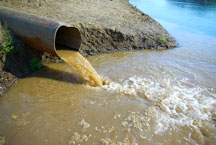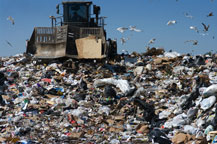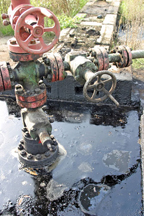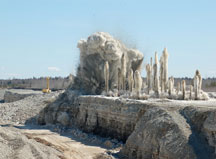The RPS Difference
 RPS has developed innovative technologies for industrial products. These products safely and effectively remediate pollutants, waste products and strong odors without exposing people, animals or sensitive ecosystems to toxins, harsh chemicals, allergens or volatile organic compounds (VOCs). RPS Technology has been proven effective in some of the most difficult environments and has been recognized by the EPA’s Design for the Environment (DfE) for safer chemistry.
RPS has developed innovative technologies for industrial products. These products safely and effectively remediate pollutants, waste products and strong odors without exposing people, animals or sensitive ecosystems to toxins, harsh chemicals, allergens or volatile organic compounds (VOCs). RPS Technology has been proven effective in some of the most difficult environments and has been recognized by the EPA’s Design for the Environment (DfE) for safer chemistry.
Heavy Metals Contamination
RPS Technology provides remediation products that bind to heavy metals rendering then non-bioavailable and non-mobile (minimizing the risk of entering the groundwater).
Hydrocarbon Contamination
RPS Technology has been successfully used in the catalytic conversion of organic environmental contaminants with minimal effort and application techniques. When applied to impacted soil, a minimal reaction time renders the contaminant irreversibly altered and non-hazardous.
Odor Pollution
RPS Technology provides products that attack odor and odor related pollution at the source. The products do not cover up or mask odors with perfumes or scents. Instead, they eliminate odor and related pollution.
Right Here in America
 Every year in America, thousands of harsh chemicals are released into the air, ground and water. Liquid cleaners are poured down drains, seeping into our ecosystems and killing off fish and other organisms. The disposal of animal waste releases thousands of pollutants into the water we drink and the air we breathe. Tons of waste products are dumped in landfills, releasing offensive odors and chemicals into the air, soil and water. Waste oil flows into our oceans and heavy metals contaminate our air, soil, water and food.
Every year in America, thousands of harsh chemicals are released into the air, ground and water. Liquid cleaners are poured down drains, seeping into our ecosystems and killing off fish and other organisms. The disposal of animal waste releases thousands of pollutants into the water we drink and the air we breathe. Tons of waste products are dumped in landfills, releasing offensive odors and chemicals into the air, soil and water. Waste oil flows into our oceans and heavy metals contaminate our air, soil, water and food.
RPS has developed cleaning, remediation and odor elimination solutions for industrial applications that contain ZERO volatile organic compounds (VOCs) and are FREE from toxins, harsh chemicals, allergens and fragrances . Even in extreme or adverse conditions, this RPS Technology has been proven to be both safe and effective.
Animal Feeding Operations
 In America, approximately 450,000 animal feeding operations (AFOs)* produce nearly two trillion pounds of animal waste each year. This waste contains 11 billion pounds of nitrates, nearly 3 billion pounds of phosphorous and other pollutants, including pathogens, heavy metals, hormones, antibiotics and ammonia, some of which flow directly into the waters we use for drinking, swimming and fishing.
In America, approximately 450,000 animal feeding operations (AFOs)* produce nearly two trillion pounds of animal waste each year. This waste contains 11 billion pounds of nitrates, nearly 3 billion pounds of phosphorous and other pollutants, including pathogens, heavy metals, hormones, antibiotics and ammonia, some of which flow directly into the waters we use for drinking, swimming and fishing.
AFO waste contributes to significant air quality problems like dust, smog, greenhouse gases and odors. This poor air quality is hazardous to animals and people. For example, there is considerable loss on chicken and turkey farms due to ammonia, dust, and the bacteria, viruses, and fungi that can be carried by dust. Many birds die or are prevented from entering the food chain by inspectors due to disease. This is an economic loss for growers and a health risk for the workers and neighbors of the operations.
Another major concern for people who live near AFOs is odor and the health risks from odor exposure. According to North Carolina Department of Health and Human Services State Health Director, A. Dennis McBride, MD, MPH, exposure to environmental odors results in physiological stresses that may cause a variety of symptoms, including headache, nausea, loss of appetite, and emotional disturbance. Odors may also exacerbate stress-related illnesses.
In addition, most common industrial remediation products contain toxins, harsh chemicals and volatile organic compounds (VOCs) that can actually make health problems worse for animals and people.
RPS Technology powerfully remediates ammonia, hydrogen sulfide, dust and strong odors without exposing animals or workers to toxins, harsh chemicals, allergens, fragrances or VOCs.
*The EPA defines AFOs as livestock-raising operations (i.e., hog, cattle, dairy, sheep, and poultry farms) that congregate animals, feed, waste and production operations on a small land area.
Landfills

Landfills are notorious for the foul odors they produce. Odor problems at landfills have become so widespread that it is now considered the most critical issue facing landfill operators today. While these odors may not be life-threatening, exposure can cause headaches, nausea, loss of appetite, respiratory problems and stress-related illnesses.
Many of the industrial deodorants and odor neutralizers used to reduce landfill odors serve to mask odors, but do not eliminate them completely. These products also contain toxins and volatile organic compounds (VOCs) that can be hazardous to people and the environment when released into the air.
RPS Technology eliminates odor at the source and controls dust pollution without any toxins, harsh chemicals or VOCs.
Waste Oil

An estimated 706 million gallons of waste oil enter the ocean annually due to storm-water drainage from cities and farms, untreated waste disposal from factories and industrial facilities, oil spills or leaks and other sources.
The short-term effects of toxic waste oil include poisoning fish and other sea creatures, as well as mammals, reptiles, amphibians and birds that live in or near the ocean. The long-term effects can damage area ecosystems and pose serious health threats. Over time, oil begins to break down, slowly releasing hydrocarbons into our water and soil. Exposure to hydrocarbons can cause respiratory problems as well as drowsiness, poor coordination, coma and seizures.
RPS has created an effective solution to remediate hydrocarbon contamination in water, soil, sand and other environments. RPS Technology works much faster (even in adverse conditions) when compared to microbial treatments.
Heavy Metals

In many industrial factories and commercial operations, the release of toxic heavy metals is unavoidable. The use of coal for electricity, the use of fracking for the recovery of natural gas and oil, and the growing of hogs for food are all necessary parts of our economy and life, but unfortunately all can result in the heavy metal contamination of land and waterways.
Metals contamination can occur through spills, waste handling, airborne dust settling to the ground and rainwater runoff. Soil, water and other media contaminated by heavy metals pose a serious health threat. Many heavy metals, ingested through airborne dust, food or water, have toxic effects at very low levels.
RPS Technology can remediate heavy metal contaminated soil, water and other media (including coal ash). Products powered by RPS Technology™ have been used to remediate lead, copper, zinc, arsenic, chromium, mercury (in fact, all of the RCRA 8 metals and more), in many cases to non-detect levels. RPS Technology can also be used for more complicated wastewater challenges with multiple contaminants. RPS Technology has been proven to reduce ammonia nitrogen in wastewater below regulatory levels quickly and easily.
RPS Technology chemically alters the metals to render them non-mobile and non-bioavailable, and can be used in situ or ex situ.
RPS Technology can help many industries, including power, natural gas, animal habitat (hog, chicken and other farms), mining, and agriculture to name a few.



